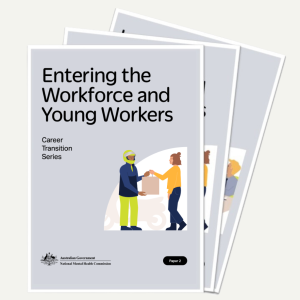Early career & graduates
When we help
We can help you build successful and sustainable careers within your workplace
Together with advances in science, technology and COVID-19, the world has changed forever. Graduates entering the workforce are stepping into a very different environment from previous entrants.
Now more than ever, leaders are called upon to support their graduates in a way that sustains wellbeing and allows them to view their careers through a long-term lens, and that’s where we step in!
Graduate Transition Skills Sessions
Drawing from our extensive experience and research on supporting early career professionals, our graduate transition skills sessions help your grads focus on developing critical skills in early career.
We’re proud to offer a series of transition skills sessions to support early career workers to thrive. All sessions are 1.5 hours, but can be extended to two hours to allow for more discussion.
We can help your early career employees develop the skills to:
- Reduce risk of burnout.
- Manage feedback.
- Build psychological flexibility.
- Adjust to workplace expectations.
- Bounce back from setbacks.
- Foster connection, and more.
With a sharp increase in mental health assistance requests, it is imperative that workplaces implement proactive mental health and wellbeing initiatives that build capability and sustainability.
Sessions for Leaders Supporting Early Career Workers
Leaders play a pivotal role in shaping the graduate experience, particularly as young professionals integrate into teams navigating unprecedented workplace changes. Their influence is key in shaping the overall workplace atmosphere and fostering a sense of belonging among early career employees.
Our leader sessions are designed to help build capability of your leaders so they can best harness the talent of your early career workers.

Career Transition Series
Many of us will experience career transitions in our lifetime - whether it is having a baby or a career change, managing a personal crisis, or retiring from the workforce altogether. As an employer or manager, it can be hard to know how best to support someone during these times of career transition.

The Career Transition Series provides workplaces with research-led and practical approaches. Itshares the stories of organisations supporting their people through eight key transitions, highlights what has worked and relays lessons for others.
Young people provide significant value to the workplace but can be vulnerable to a range of mental health and wellbeing challenges.
Positive early experiences at work can be a protective factor to help develop resilience and the ability to adapt to challenges at work and improve longer-term mental health and wellbeing outcomes.
Team Dynamics Training (PsyCap)
Empower your leaders to best support graduates as they transition to the workforce with team dynamics training.
Together, you can unpack the challenges that present in this new time of transition, and build positive thinking patterns that can challenge and replace deep-seated assumptions and beliefs, and ultimately build team cohesion to ensure sustainable practices across this important life-work transition.

